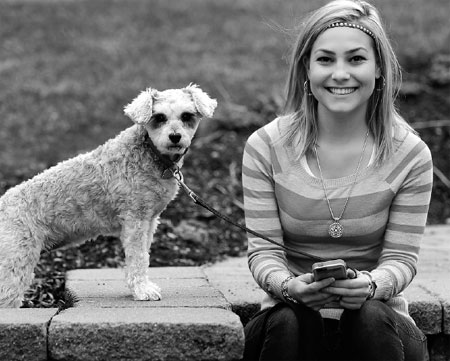Choices aplenty as dating apps grow
People raised on Google and social media now have the chance to do background checks on potential mates. Barbara Ortutay reports in NewYork.
So, a lady walks into a bar... Wait, scratch that. A lady takes out her phone. With a left swipe of her finger she dismisses Alex,25, and Robert, 48.She swipes right when a photo of James,24, pops up. James had swiped right, too. It's a match! They chat, and make plans to meet. After all, they're only 4 kilometers apart.
Welcome to the new world of dating. As the near-constant use of smartphones prolife rates and as people grow more comfortable with disclosing their locations, a new class of mobile dating applications is emerging that spans a range as broad as human desire itself.
Millennials, busy with school, jobs and social lives, say the apps save time and let users filter the undesirable, based on a few photos, words and Facebook connections. Unlike the dating websites of yore, with endless profiles to browse and lengthy messages to compose, newer apps offer a sense of immediacy and simplicity.
In the United States, online community Christian Mingle will "find God's match for you". Mobile application Hinge's promise hinges on its ability to hook you up with friends of friends.
Coffee Meets Bagel, meanwhile, will present you with just one potential mate at noon every day. Dattch, with a Pinterest-like interface, is for women seeking women. For men looking for men, there's Grindr, Jack'd, Scruff, Boyahoy and many more. Revealer will let you hear a person's voice and only show photos if you're both interested.
The darling dating app du jour for Americans is Tinder, helped by its simple interface, a host of celebrity users and a popularity boost from Sochi Olympic athletes who used it to hook up during the Winter Games.
Tinder, like many dating apps, requires people to log in using their Facebook profiles, which users say adds a certain level of trust. Facebook, after all, is built on knowing people's real identities. Your Tinder photos are your Facebook photos. Users can reject or accept potential mates with a left or right swipe of their finger. If both people swipe right on Tinder, the app flashes "It's a match!" and the pair could exchange messages.
Because messages can only come from a person you've "right-swiped", unwanted advances are filtered. The system avoids one of the more vexing problems of older-generation dating websites, where users, especially women, can become inundated with messages from unwelcome suitors. They also offer a generation raised on Google and social media a chance to do background checks on potential mates.
"If you are in a bar and a guy comes to talk to you, you are immediately going to be freaked out and you don't want to talk to them because they are drunk," says Melissa Ellard,23, who uses Hinge and says she wouldn't have gone on a date in the past six months were it not for the app.
"When you are using the app, you get to look at their picture and see background information. You get to decide whether you want to continue it or not. When I meet someone, I want to know everything about them before I go on a date with them."
A recent Pew study found that some 9 percent of US adults say they've used dating sites or mobile dating apps, up from 3 percent in 2008.Of those who are "single and looking", the number jumps to 38 percent, according to the 2013 survey.
The crowd trends slightly younger, with the largest group of users between 25 and 44.Clearly, many people have grown comfortable with online dating just as they have with shopping and banking.
Cue the cries of "the lost art of courtship" and the "rise of hookup culture" from older generations, who harbor selective memories of the more analog hookup culture of their youth.
"There is a general digital fear," says Glenn Platt, professor of interactive media studies at Miami University. "People are happy to giggle and watch Barney in How I Met Your Mother hook up with people based on looks. But somehow taking that same behavior and placing it in a digital context has a stigma attached to it. Even though in that context you are more likely to get a better match, more information, a person's real name."
Despite the growing acceptance, the online and app-based dating market is small. Research firm IBIS World estimates that the dating services industry will hit $2.2 billion in revenue this year. Internet conglomerate IAC/InteractiveCorp has the biggest chunk of the market with a 27 percent share.
|
Melissa Ellard poses for a photo with her dog, Nike. |



















